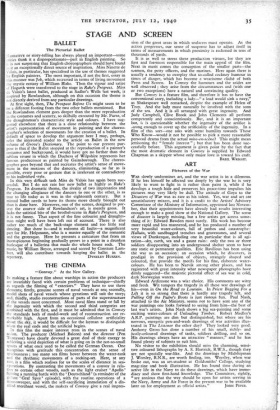THE CINEMA
Convoy." At the New Gallery.
IN making a feature film about warships in action the producers are invariably faced with certain problems of technique—chiefly as regards the filming of " exteriors." They have to use three elements; firstly, genuine scenes of naval vessels at sea; secondly, model shots of naval vessels whose gyrations will suit the story; and, thirdly, studio reconstructions of parts of the superstructure of the vessels most concerned. Most naval films stand or fall by the ingenuity with which the second and third categories are combined with the first, and it must be admitted that in Convoy the standards both of model-work and of reconstruction are re- markably high. Apart from an occasional cellulose artificiality about the, sky, it would be difficult for the layman to distinguish When -the real ends and the artificial begins.
In this film the major interest rests in the scenes of naval action. The producer (Michael Balcon) and the director (Pen Tennyson) have clearly devoted a great deal of their energy to achieving a vivid depiction of what is going on in the not-so-small spaces of what once used to be called the German Ocean. One recognises with gratitude this concentration on the sense of spaciousness ' • too many sea films hover between the water-tank and the rhythmic movements of a rocking-set. Here, at any rate, is a film which realises for us the scales of distance in sea- cperations. By contrasting the movements of a convoy in rela- tion to certain other vessels, such as the light cruiser Apollo ' fighting a running battle with the `Deutschland' (a reminder of the gallant Graf Spee ' epiiode), with the routine operations of a mine-sweeper, and with the self7sacrificing immolation of a dis- abled merchant vessel, the makers of Convoy give a real impres-
sion of the great areas in which seafarers must operate. As the action progresses, our sense of suspense has to adjust itself in terms of measurements in which proximity is reckoned in tens of thousands of yards.
It is as well to stress these production virtues, for they are first and foremost responsible for the main appeal of the film. Next in merit comes the conception of the smaller parts—the stamen, the petty officers, and the marines. Here again there is usually a tendency to overplay that so-called cockney humour in times of danger, which has become a wearisome cliché of both Press and Screen. In Convoy the humours and the asides are well observed ; they arise from the circumstances and (with one or two exceptions) have a natural and convincing quality.
But Convoy is a feature film, and therefore it has to have the conventional story, including a lady—" a load would sink a navy," as Shakespeare well remarked, despite the example of Helen of Troy. And the lady must naturally be involved with the sons of the sea. And it is all arranged with great ingenuity. And Judy Campbell, Clive Brook and John Clements all perform competently and conscientiously. Bu_, and it is an important but, it is questionable whether the ingenuity of the artifice is Aron& enough to cover up the artificiality of the ingenuity. In a film of this sort—one asks with some humility towards Those Who Know—would it not be possible to pick a more reasonable personal drama from the actual mise-en-scene? This might mean jettisoning the " female interest " ; but that has been done suc- cessfully before. This argument is given point by the fact that the most dramatic element in Convoy is supplied by Edward Chapman as a skipper whose only major love is toward his craft.
BASIL WRIGHT.


























 Previous page
Previous page